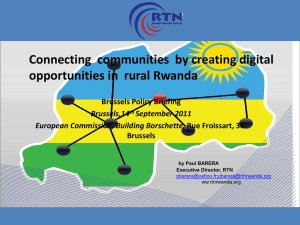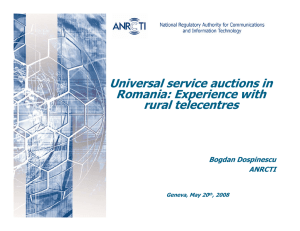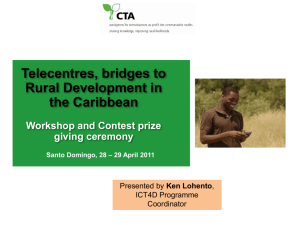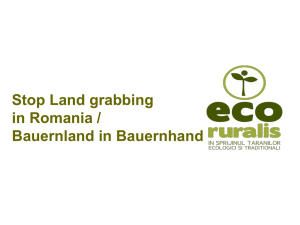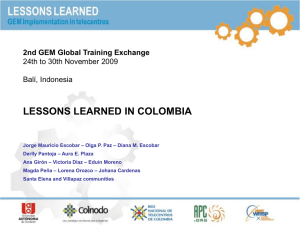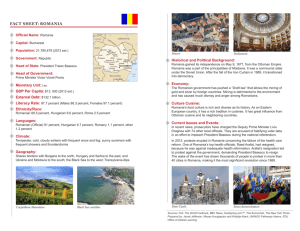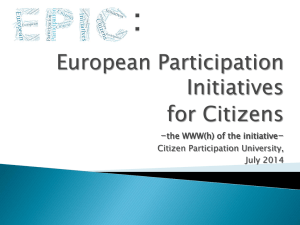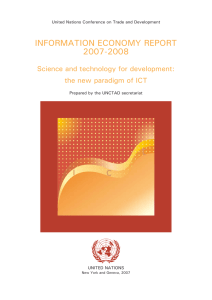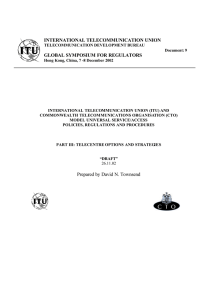Romania - IAN-a
advertisement
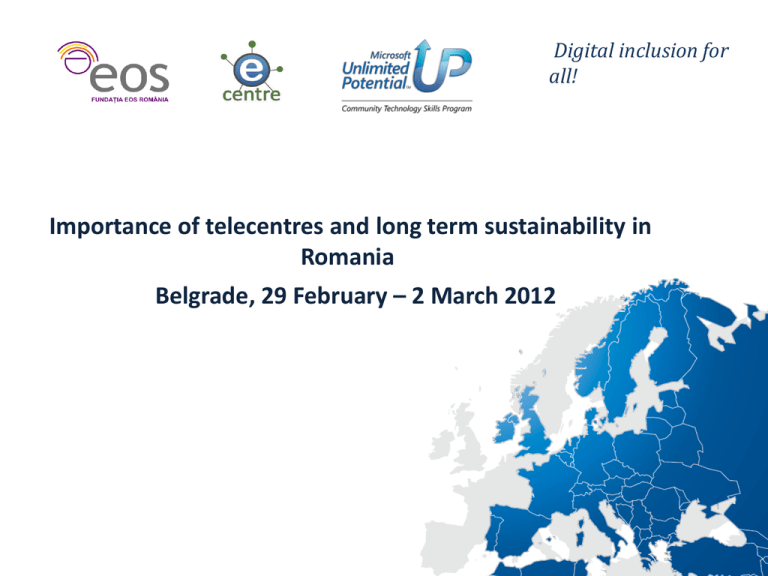
Digital inclusion for all! Importance of telecentres and long term sustainability in Romania Belgrade, 29 February – 2 March 2012 Digital inclusion for all! EOS mission EOS mission is to reduce the digital divide by creating and providing opportunities for all community members, in order to acquire ICT skills and abilities necessary to use informations and to create new knowledges, things that are essential for participation in the development of an open society based on knowledge. Digital inclusion for all! Telecentres network in Romania/e-centres In Romania telecentres are different structures and they were established by different actors and through various programs. Therefore we have many types of telecentres: • E-centre network - that was established by EOS Foundation with the support of the Microsoft Unlimited Potential Program since 2007 until present and which has in the present a number of 40 active centres (www.ecentre.ro).The ecentres are educational centres, non-profit or community organizations. • Public Access Points to Information – these centres were created through the "Knowledge- based Economy" project, initiated by the Romanian Government through the Communications and Information Society Ministry supported by the World Bank. Digital inclusion for all! Telecentres network in Romania/e-centres • Libraries with free access to internet and IT trainings - telecentres that were equipped with computers for the public through the Biblionet project, funded by the Foundation Bill and Melinda Gates. Digital inclusion for all! Beneficiaries of the telecentres network in Romania/location of telecentres All the community members with a main focus on disadvantaged groups as: • Elderly people – basic skills of ICT, most of them are using the computer just to socialize with people at the same age and with their relatives; • Unemployed – attending ICT courses in order to get a job • Young people from families with social problems – so they can be better integrated on the labor market. Farmers – other beneficiaries of the local rural telecentres – they are helped by the staff to write application so they can get European fund for their subsistence farms. Digital inclusion for all! Long term sustainability of telecentres in Romania Long term sustainability of the telecentres in Romania is different depending of the type of the telecentre: Individual telecentres – NGO’s ensure their sustainability though: • European funds by writing project on the Life Learning Programme – Grundtvig, Leonardo da Vinci, Youth in action – free courses for community members; cross border projects • Establish o fee for the courses that they are offering which can be ICT courses, entrepreneurship courses, language courses, vocational courses; • Identifying private donors, interested to invest a part of their profit in communities using the CSR activities; in Romania in the past few years the number of the private companies that are developing CSR activities increased very much and also the number of the projects including this activities are growing each year. Digital inclusion for all! Long term sustainability of telecentres in Romania • Establish partnerships with local agencies for employment and other organisation which are offering IT training and other type of courses in order to work together and to offer a better support for people in their communities through the telecentres services; • Renting their training space to other training providers for the community or for other events. Digital inclusion for all! Long term sustainability of telecentres in Romania Long term sustainability of the public telecentres – PAPI’s and libraries Their activities are carried out with the support of the town hall because telecentre is a part of the local municipality. The situation of this telecentres regarding the long sustainability is quite different because they receive support and funding from the government: salaries for the telecentres staff, the location for the telecentre, and the utilities are paid by the municipality. . Local taxes established for a part of their services: • Community members can access the internet for a small amount of money (per hour), • printing and scanning are also services to be paid. This money is used in order to cover a part of the expenses with the utilities, and also sustain the free courses delivered in the telecentre. Digital inclusion for all! Thank you! +40 256 498 172 Cornelia Popescu, Project coordinator EOS Romania www.eos.ro. office@eos.ro; cornelia.popescu@eos.ro
